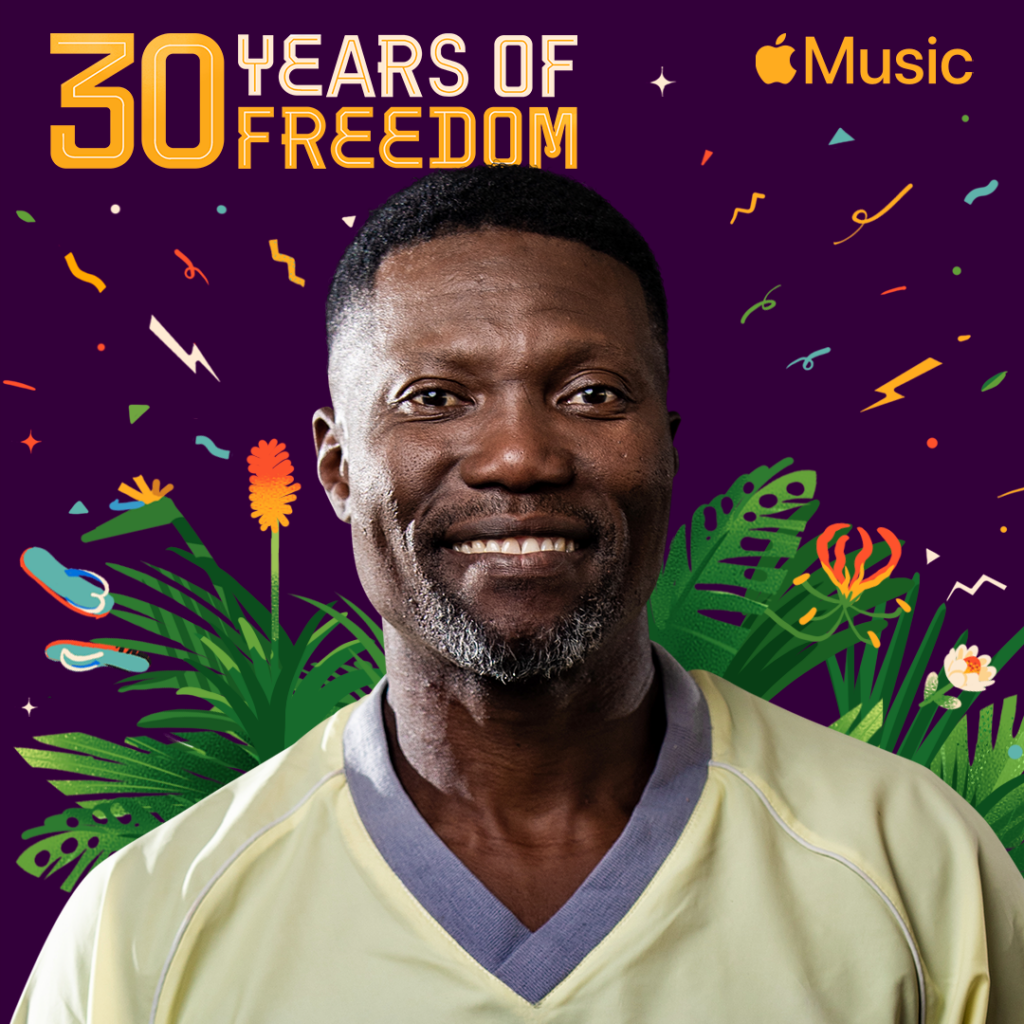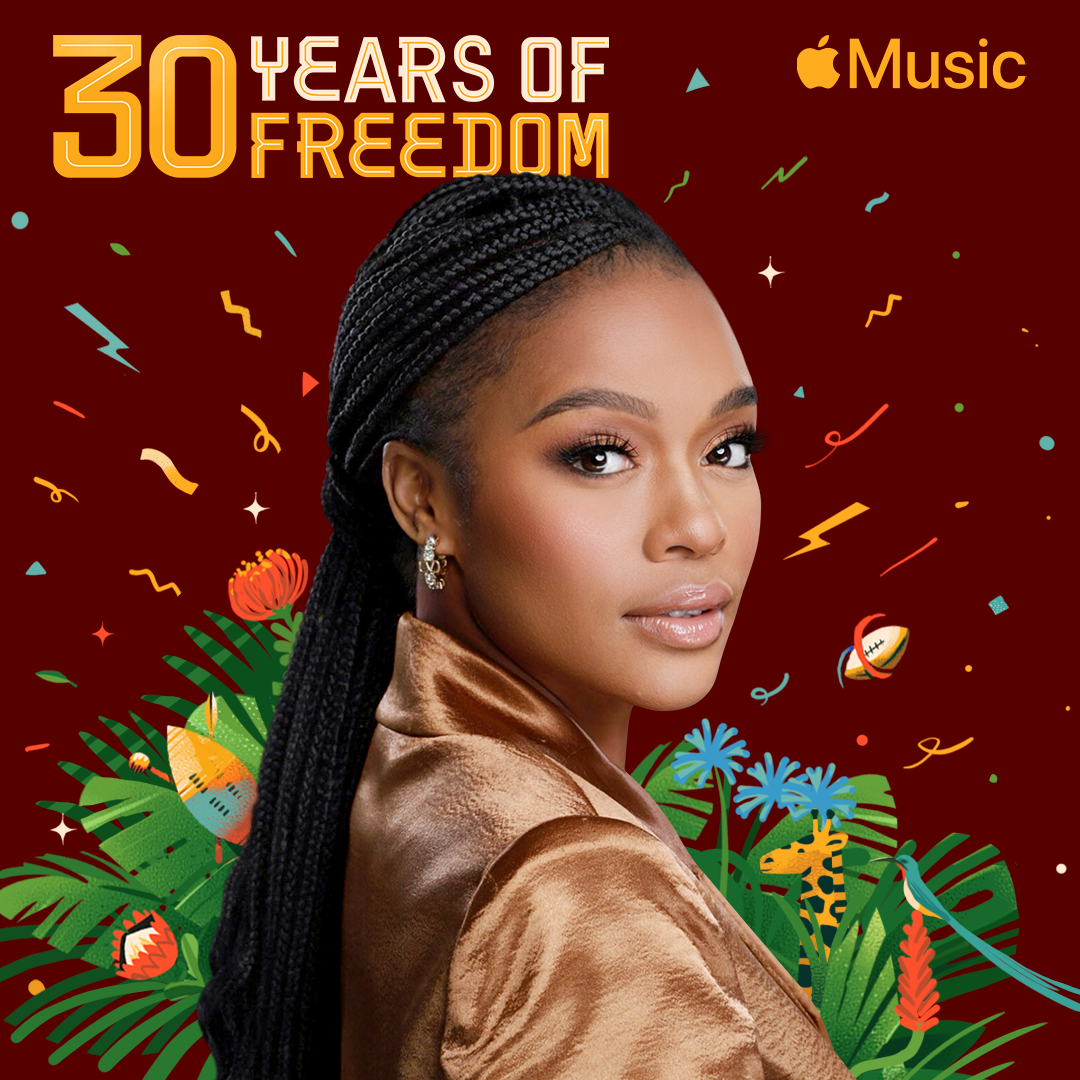
Apple Music Celebrates 30 Years of Freedom with Quotes from South African Legends
As South Africa celebrates 30 years of freedom this year Apple Music will be marking the occasion by paying homage to the excellence and resilience of South Africa’s people with the 30 Years Of Freedom campaign. Music played a vital role in South Africa’s liberation, and the campaign will shine a light on the songs and albums that have been the ultimate soundtrack to freedom. Ahead, quotes from South African entertainment legends celebrating 30 years of freedom.
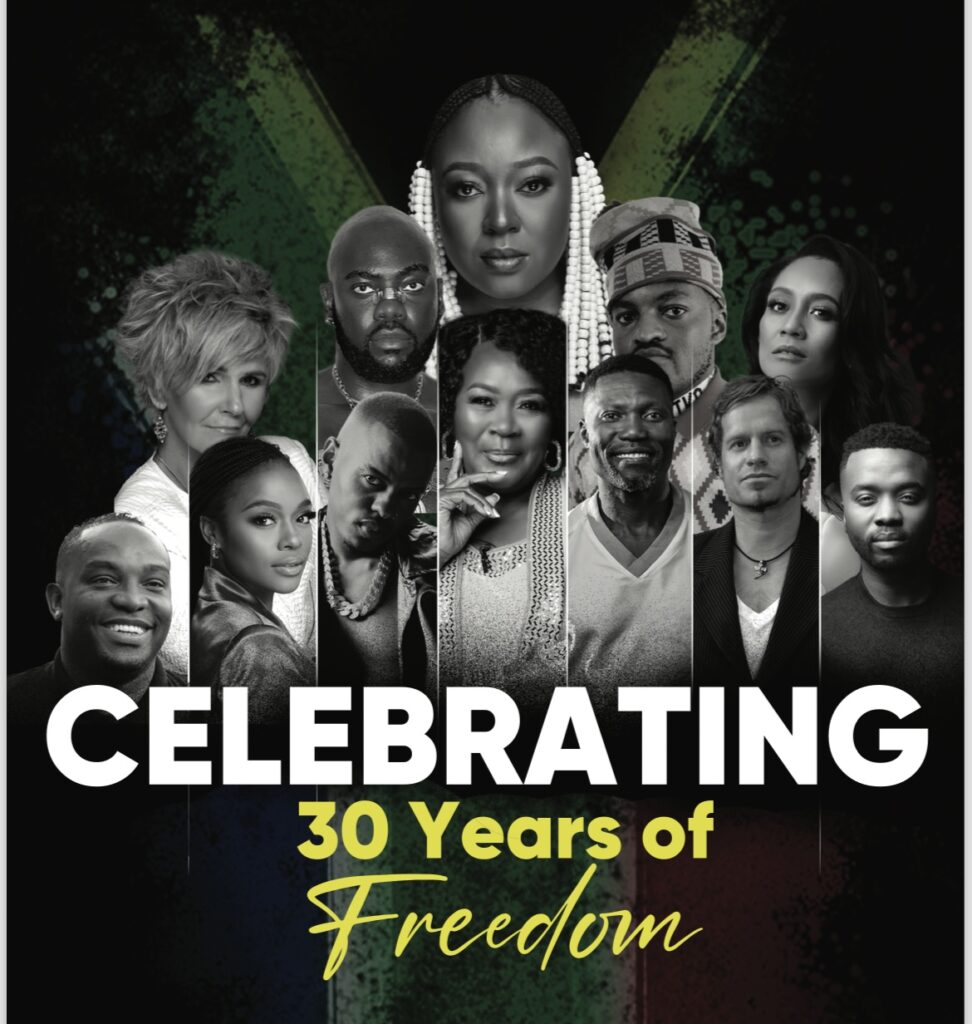
Benny McCarthy
What makes these songs special for you, and how have they found new life or meaning for you over the years?
My childhood memories, growing up in the Cape Flats. These were the songs that gave you hope and aspirations of one day making a difference in people’s lives. It was all about making a success of your life and dreaming about becoming famous just like them.
How do you think these songs—and the artists who originally performed them—have shaped South African culture?
The big change that happened, new government, new president that came with [obscured] opportunities of a better South Africa. This was the era in which I made my dreams become a reality, my life, together with my family change for the better. I became an international football player and a very, famous one, I was also very [obscured] privileged to make music with a popular local SA kwaito band called TKZee. I had a hit single called Shibobo with TKZee.
Thirty years after the birth of our modern democracy, what is your hope for future generations of South Africans?
New generation of artist and music in SA became part of our daily lives. Many song’s were based on successful SA around the globe and I was fortunate to have a few made in my honour. It was all about rising from poverty and no future and opportunity to making a good life for yourself & family; inspiration comes from following your dreams and never letting where you come from stop you from becoming a success story.
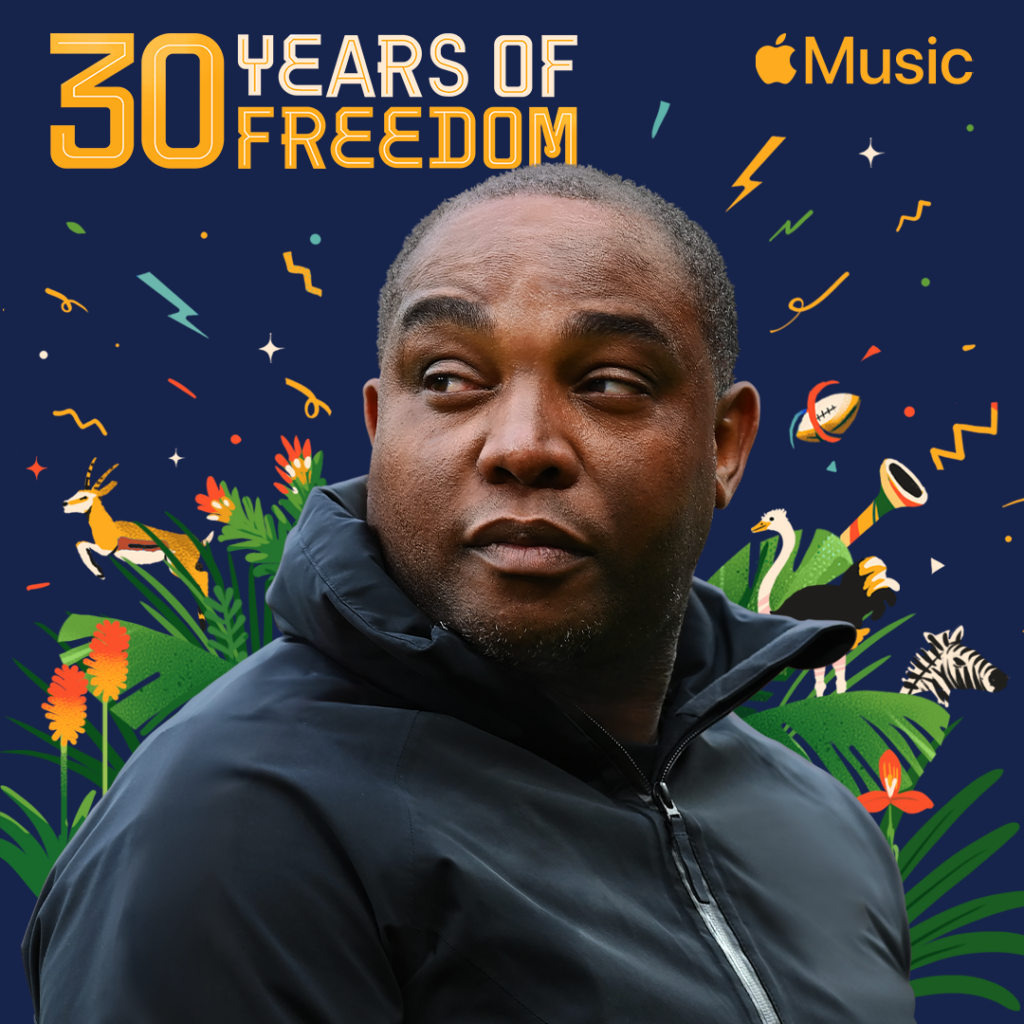
Benny McCarthy 30 Years of Freedom Apple Music Playlist
Nomzamo Mbatha
What makes these songs special for you, and how have they found new life or meaning for you over the years?
They’re deeply nostalgic. I think of a time when it would be a Saturday morning, my father making breakfast so the kitchen fills with the aroma of eggs and bacon and toast. Whilst the living room is fuming with Mr Min furniture spray. By the time both tasks are done there’s the freshest breeze meandering through the house. The purest joy and feeling of gratitude for family.
They remind me of teenage years when questioning adulthood and Yizo Yizo is at top of mind! Whilst moving through a time in college where on Friday and Saturday nights we would be caught dancing on top of speakers. December summer days of GQOM hitting the speakers and moving an inexplicable feeling… Grateful for the chance to live in a new renaissance of South Africa. They remind me, that South Africa has always and will always create music that unifies and solidifies lifetime memories.
How do you think these songs—and the artists who originally performed them—have shaped South African culture?
They have given us a lifetime of memories. We have specific feelings and distinct memory with these songs. There are people who make music and then there are ARTISTS. These folks… these folks are artists. The originality, the audacious ambition, the swag, the glorious grounding in the places they take us … it’s unmatched.
Thirty years after the birth of our modern democracy, what is your hope for future generations of South Africans?
To seize this country and to give it the promise it deserves.
“The great powers of the world may have done wonders in giving the world an industrial look, but the great gift still has to come from Africa – giving the world a more human face.” Steven Biko
What do you think makes South African people so special?
Oh it’s simple…
‘je ne sais quoi’ : noun
a quality that cannot be described or named easily.

Nomzamo Mbatha 30 Years of Freedom Apple Music Playlist
PJ Powers
What makes these songs special for you, and how have they found new life or meaning
for you over the years?
I have chosen my list and songs based on knowing exactly where I was and how I felt the first time I heard them. From the first time I heard Brenda sing “Black President” and the pride I felt to the sadness in my heart when I heard Bright Blues “Weeping”. None of these songs whether protest or simple love songs in my opinion have dated or ever will.
How do you think these songs—and the artists who originally performed them—have shaped South African culture?
We have such a beautiful culturally diverse country that if someone listened to this playlist they would think I was musically schizophrenic. The truth is all these artists have added to the fusion of sound that we are able to so proudly call South African Music. I believe together with new emerging artists these artists and their music will continue to to shape South African Culture.
Thirty years after the birth of our modern democracy, what is your hope for future generations of South Africans?
South Africa’s diverse Culture whilst rich and strong I believe is not being used enough as a tool to bring us together which we all know is sorely needed. I wish for the day when, like in India on Heritage day, people go out and celebrate AND respect our different cultures. I will never forget Nelson Mandela and I having a conversation when he said “South Africa Needs to be like a Fruit Salad” when I asked what he meant he said “we need to retain our different flavours and colour we need to compliment each other I one bowl” I smiled but thought it was genius.
We need to be aware of what guidance we will take in protecting our future. We are in a precarious place and we cannot afford to allow poor people to get any poorer, we need to vote with our heads this year not our hearts. That is our future!

PJ Powers 30 Years of Freedom Apple Music Playlist
Connie Chiume
These songs hold a special place in my heart because they not only gave us hope but continue to resonate with meaning to this day. My playlist transcends from the older generation to the youth of today, reflecting the evolving celebration in contemporary music. I’ve included some international musicians who became part of our musical culture, and we still cherish their contributions today.
The music and musicians have played a pivotal role in shaping South Africa, serving as a source of inspiration during times when we needed courage to fight for our rights. Some songs provided a sense of entertainment, keeping us sane. The music from the past paved the way for the diverse genres we hear today.
My hope for the future of South Africa is for it to emerge as one of the world’s superpowers, marked by good governance, free from corruption, and devoid of societal ills. I envision a country where all South Africans have access to quality education and enjoy a good life due to a thriving economy.
The resilience of South Africans, particularly during the challenging times of apartheid for black individuals, sets them apart. Despite the hardships, they strive to improve their lives. South Africans exhibit creativity in various forms, work diligently when opportunities arise, and maintain a spirit of laughter, song, and dance. They actively contribute to literature, create innovative solutions, and embrace a continuous willingness to learn.
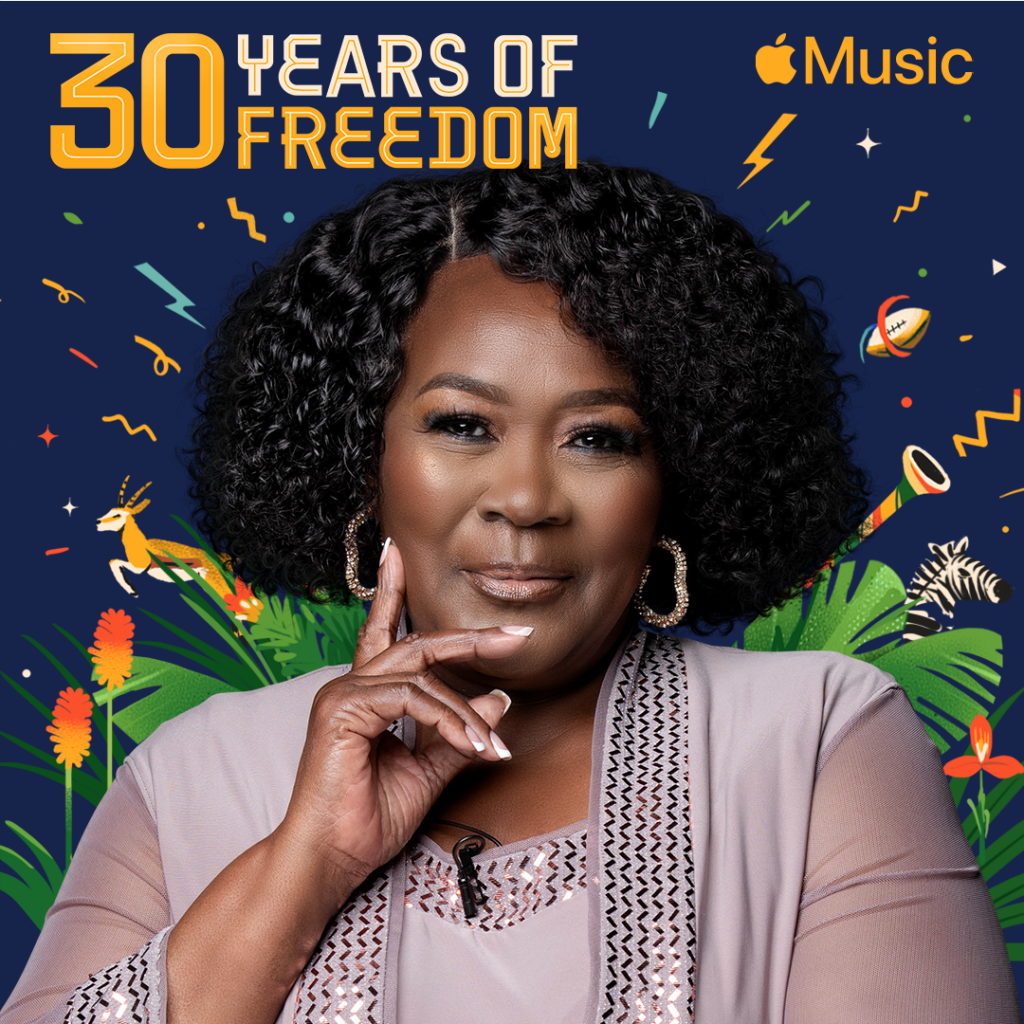
Connie Chiume 30 Years of Freedom Apple Music Playlist
Rich Mnisi
This playlist is about multiple generations of homegrown creativity, represented by predominantly 3 genres born and developed here: kwaito, amapiano and gqom. It’s made up of voices that built South Africa’s musical legacy and birthed these descendant sounds, alongside the voices doing new things with the incredible legacy left to us.
We have the pioneers like Lebo Mathosa and Brenda Fassie, amazing creative minds who opened doors for so many, with their influence even leaping beyond music to fashion and other industries. They were so ambitiously, violently, and unapologetically themselves, and this unlocked an era of new narratives and storytelling.
We have newer voices like Tyla, who have created a new offering from that legacy with a sound that is now taking over the world, following in the global footsteps of names like Black Coffee, Dj Lag and Petit Noir.
Others keep us grounded by visiting nostalgia with a new lens, like Zoë Modiga, or bring the marginalised to centre stage, like Faka introducing queerness to predominantly masculine gqom culture.
By sharing their gifts, many of these artists have given us the opportunity to come together around their songs, breaking down barriers that keep us apart by bonding us with the power of music. They reflect pillars of identity that make SA so special, our courage, our hope and the resilience of our joy. I hope the next generation explore, experience and embrace new creative facets of the freedom that was so hard won for us
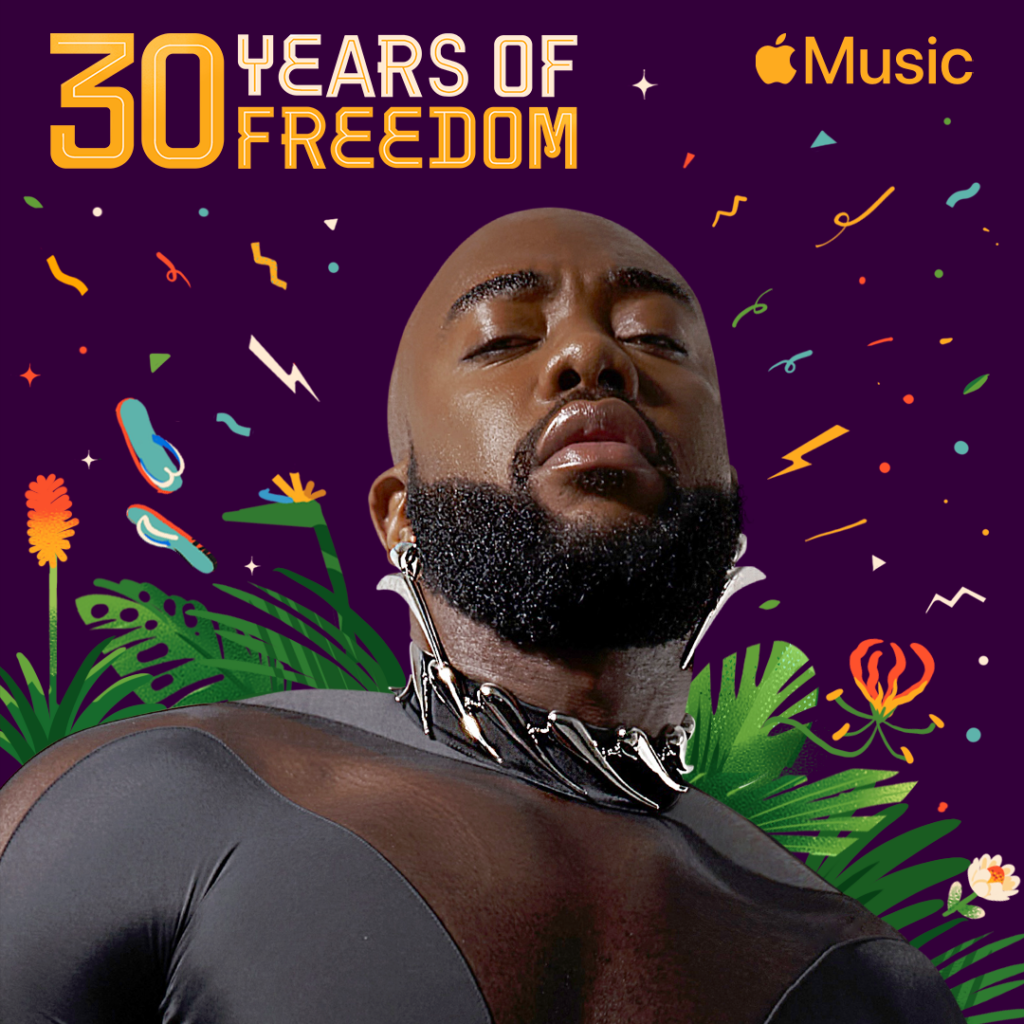
Rich Mnisi 30 Years of Freedom Apple Music Playlist
Laduma Ngxokolo
What makes these songs special, how have they found new life and meaning over the years?
“These songs take me back to different stages in my life, they are special because they are a great reference point for what I have lived through. The feeling is the same, even listening to them years after.”
How have these songs and the artists shaped South Africa?
“The majority of these songs speak of trials and celebrations that an everyday South African would go through. These songs have instilled hope in people and have encouraged them to keep going.”
30 years after the birth of our modern democracy, what is your hope for future South Africans?
“My hope for the Republic of South Africa, is for every citizen to have economic freedom. I believe that this is achievable.”
What do you think makes South African people so special?
“South African people are charismatic, we can dance and also know how to have a good time. Despite what we go through as a nation, we try not to take things seriously. The people of our nation genuinely have good hearts as well.”

Laduma Ngxokolo 30 Years of Freedom Apple Music Playlist
Mel Bala
What makes these songs special for you, and how have they found new life or meaning for you over the years?
There couldn’t be a harder ask than trying to find just thirty songs that encapsulate the history of South Africa’s musical landscape, as well as my own story that ran parallel to a lot of this music. After all this time, I’m able to look back and very clearly remember the music videos associated with the songs, or interviews with the artists or live performances we had on “Studio Mix”.
Many of these songs have a deeply personal memory attached to them too, like “Weekend Special” by Brenda Fassie being played off a vinyl in our lounge at family gatherings and the whole family dancing to it;
or like “It’s About Time” by Boom Shaka. DJ Christos was friends with my brother, and his cousin played me “It’s About Time” off a cassette in her car, pre-release – and I remember my mind being blown away by this fresh sound;
Or “Another Country” by Mango Groove capturing so perfectly the fears and hopes and dreams of what South Africa could be, before our first democratic election in 1994.
How do you think these songs—and the artists who originally performed them—have shaped South African culture?
Hindsight allows you to see the culture-shifters, the groundbreakers, the visionaries. Family Factory, the fore-runner of what we know today as Joyous Celebration, pioneered a new, heavily-influenced by African-American contemporary gospel sound. Prophets of Da City, the OGs of rap from Cape Town, nailed the zeitgeist of 1994, with their sampling of Madiba’s voice saying, “Never Again”. The Kwaito era was fiercely competitive between labels and artists but without a doubt, Kalawa Jazzmee had one of the heaviest rosters with groups like Trompies, BOP and Bongo Maffin to name a few.
TKZee’s debut album “Halloween” is iconic for a reason but it’s “Sikelela” off that album that for me showcases their musicality, innovation in sampling and signature sound. Destiny’s Child came out around 1997, and I remember Tsakani TK Mhinga telling me that she could write R&B songs just like them, in a time where South African R&B was not taken seriously; and boy did she. Her songs are timeless. She paved the way for Jamali, Elaine and Tyla.
For me, Simphiwe Dana and Lira were at the front of the Afro-Soul movement and sound we have now. Both albums so different but tapping in to jazz, soul, R&B and traditional music to weave together something uniquely South African.
I’m cheating a little bit with AKA’s “Victory Lap (Remix)” because it mixes the old guard and the new by featuring Amu, Tumi and HHP – all heavyweights in their own right in the rap/hip- hop culture and scene of SA.
In the midst of allll of that, South Africa’s house scene was coming into its own. Liquideep had us in a chokehold in 2009 with “Fairytale” ; and at a time when everyone and their mom declared that music industry sales were dead, Zahara proved them very very wrong.
Fast forward and Shekinah became the Queen of Pop, Langa Mavuso the King of RnB.
For the longest time, I didn’t quite get Amapiano – it had been an underground movement for decades – and then I heard “Asibe Happy” by Kabza De Small and I was like OHHHHHHHH – inject it into my veins!
And now, here we are, the Freedom Babies are running the charts + continuing to pioneer and influence the culture – here and across the world.
Thirty years after the birth of our modern democracy, what is your hope for future generations of South Africans?
My sincere hope for the future generations is that they remember, they can always start over. Begin again and again, as many times as needed, in building this country, their communities, themselves. We’re just at the beginning of creating a more inclusive, equitable, just and kinder world and they’ve got to take what we’ve started, and run with it.
What do you think makes South African people so special?
Our sense of humour? We can’t be beat. I think it comes from the fact that we have to laugh through the pain of all the challenges we face.
Our culture is our strength – acknowledging where we come from and showcasing and innovating it to the rest of the world. Ubuntu, our resilience and belief at heart, that South Africa could be the most amazing country on the planet.
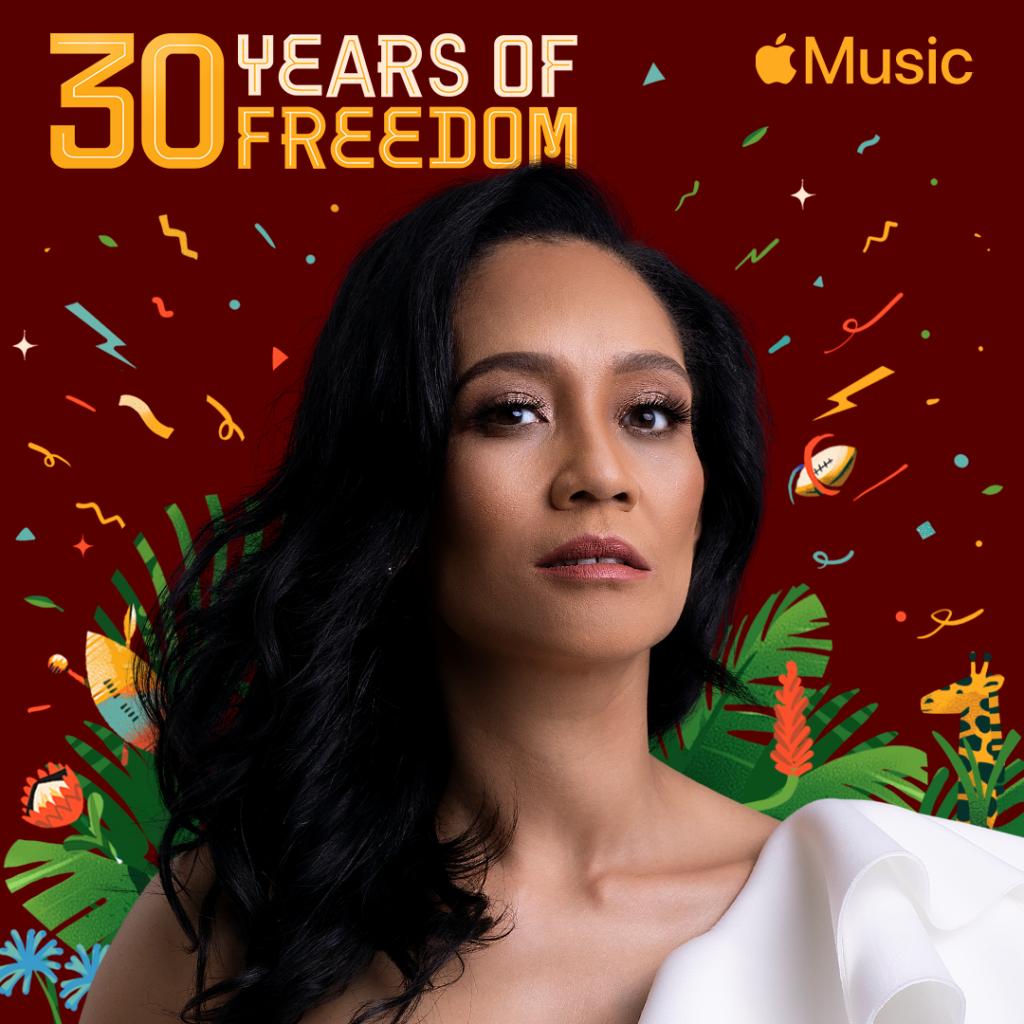
Brenda Mtambo
What makes these songs special for you, and how have they found new life or meaning for you over the years?
I find these songs to be so special because of the message it carries, these songs became our anthem over these 3 decades, and they continue to inspire this new generation. Stimela sasezola will be one of those songs that we forever feel the buzz of excitement in South Africa.
How do you think these songs—and the artists who originally performed them—have shaped South African culture?
These artist our our blue print, I remember growing up and listening to Mam Sbongile and getting inspired, mam Letta Mbulu even today inspires me , =and a lot of South African artist, because they were part of the struggle their songs even today speaks to us as South Africans , some evoke power within us , some open our eyes and seeing how far we’ve come and how far we still have to go.
Thirty years after the birth of our modern democracy, what is your hope for future generations of South Africans?
My Hope is to see a South Africa that is peaceful, driven by culture and traditions that define who we are. Democracy evolves as well, we have new obstacles that are still hindering our country that we need to fight hard for.
What do you think makes South African people so special?
What makes South Africa special is diversity and inclusivity. the fact that amapiano is now shacking the word tells you of the impact South Africa has in the word and it diversity makes us all spicy and interesting.
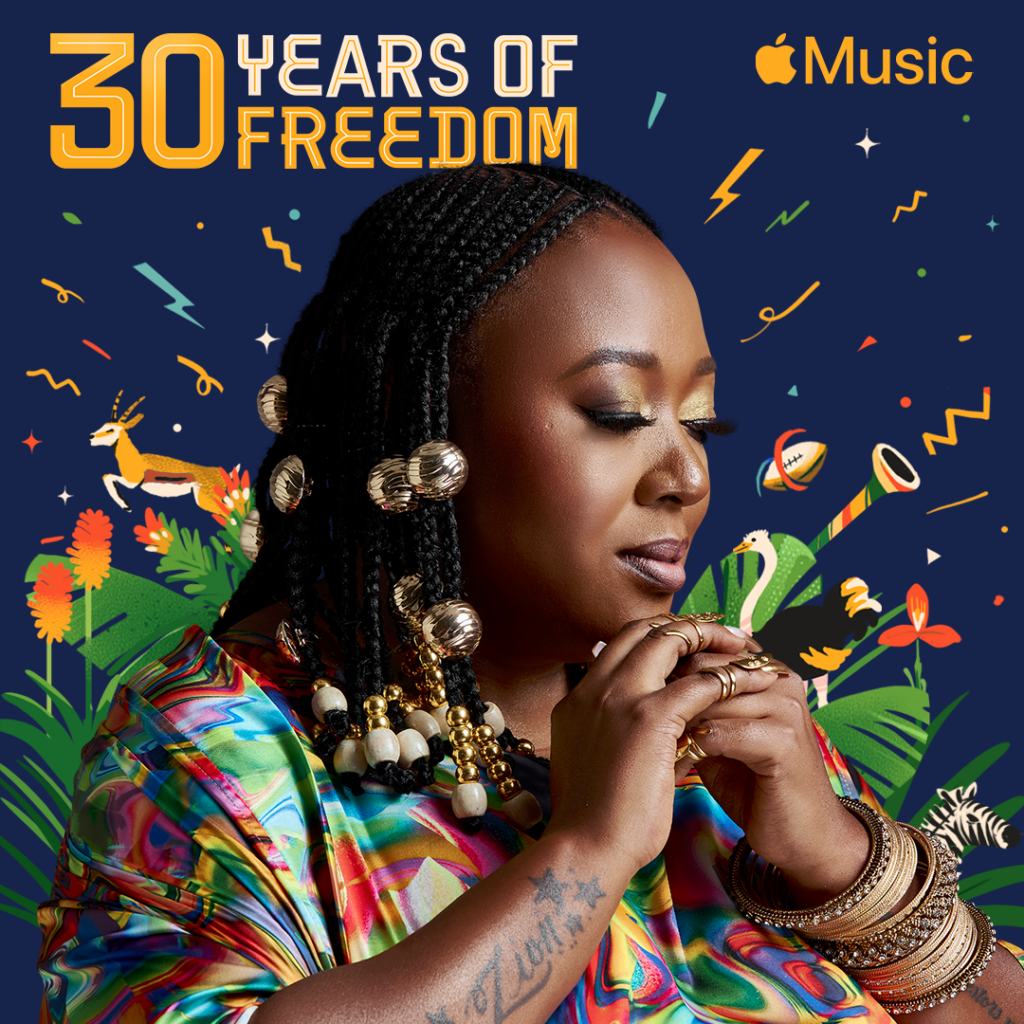
Sylvester Chauke 30 Years of Freedom Apple Music Playlist
Sylvester Chauke
What makes these songs special for you, and how have they found new life or meaning for you over the years?
These tunes are like a musical time machine, teleporting me to the days when our extended family threw epic parties for every little triumph. My uncles were the DJs, spinning these tracks that stealthily infiltrated my soul. Now, I’ve graduated to becoming the cool uncle who keeps the tradition alive with this playlist – my own time-travelling mixtape of nostalgia that keeps me connected to remembering how far we have come as a country.
How do you think these songs—and the artists who originally performed them—have shaped South African culture?
With each beat, I’m transported back to my youthful days strolling the streets of Soweto, riding the rollercoaster of hope, occasional sadness, and the bumps of brokenness, all intertwined with a strong thread of optimism for the future. These songs aren’t just a playlist; they’re a direct line connecting me to the soul of my country.
Thirty years after the birth of our modern democracy, what is your hope for future generations of South Africans?
Remaining faithful to the essence of the Freedom Charter, which echoes the timeless truth that our nation’s true prosperity and freedom hinges on every individual living in harmony, relishing equal rights and opportunities. It affirms that only a democratic state, shaped by the collective will of the people, can ensure that everyone, irrespective of colour, race, sex, or belief, claims their birth right without discrimination.
What do you think makes South African people so special?
At their finest, the essence of the South African people lies in embracing the virtues of compassion and a genuinely heart-warming smile. It’s the people of South Africa‘s ‘forever hopeful’ nature, no matter what we are going through.
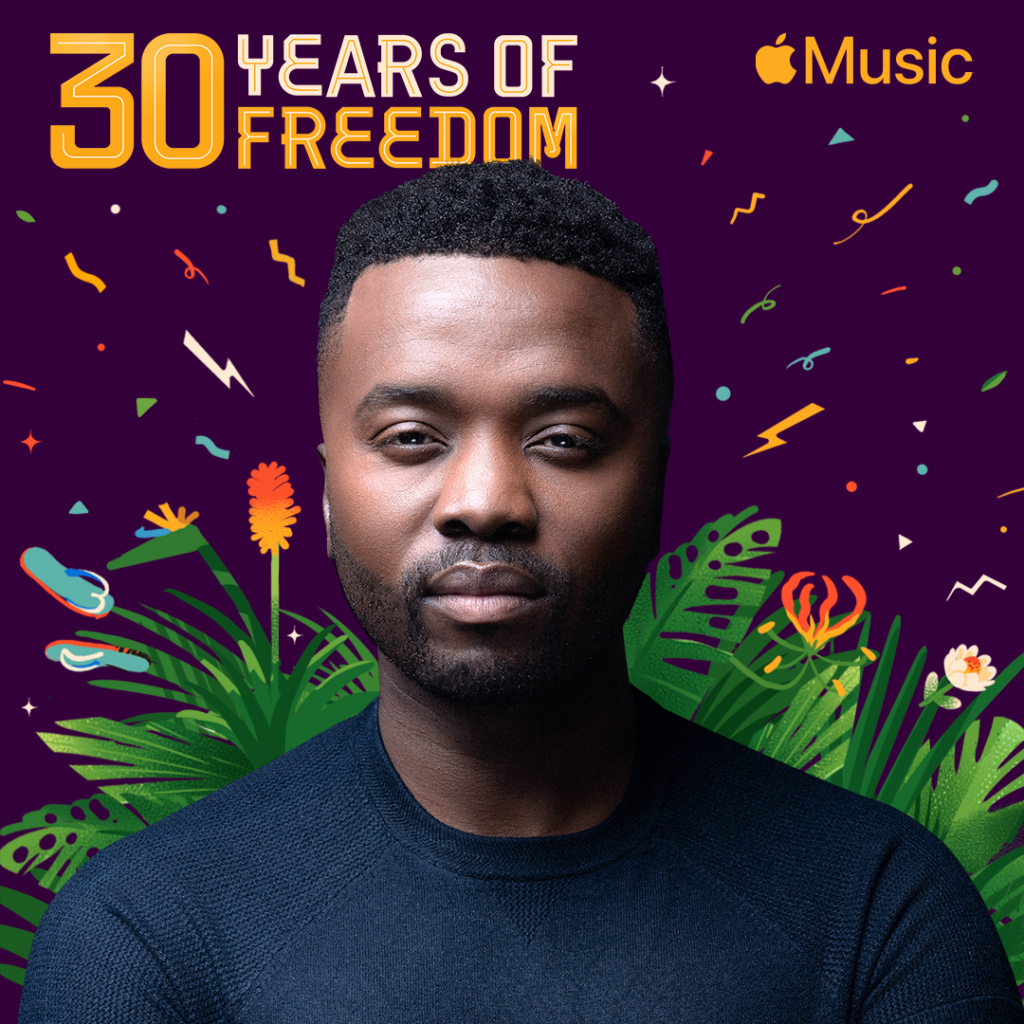
Sylvester Chauke 30 Years of Freedom Apple Music Playlist
Gregory Maqoma
These songs take us on a roller-coaster of emotions, the trials and tribulations of our beautiful country. Most of the songs signal hope and a desire for humanity to prevail, they are also songs that brought us together to sing along during difficult and happy times.
What makes these songs special for you, and how have they found new life or meaning for you over the years?
Answer: These songs are about the tried times in our democracy and how through song we able to collectively find healing and evoking memories that forces us as a nation to fight for what is right.
How do you think these songs—and the artists who originally performed them—have shaped South African culture?
Answer: The artists who wrote and performed these songs, carry the hopes of many South Africans and their love for this country beacons in the songs and voices. They did not only help us to cope with the insurmountable ordeals but became the face of humanity to the world.
Thirty years after the birth of our modern democracy, what is your hope for future generations of South Africans?
The future is in all of us to be the change we desire. I hope the future generation can overcome the past mistakes of the present future and lead design a life that is about regenerating the ultimate world they want to live in.
What do you think makes South African people so special?
Answer: We sing, we dance even when we are faced by death, the power of a collective in song and dance has made us so much stronger and unique.
